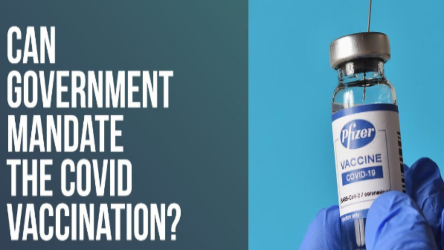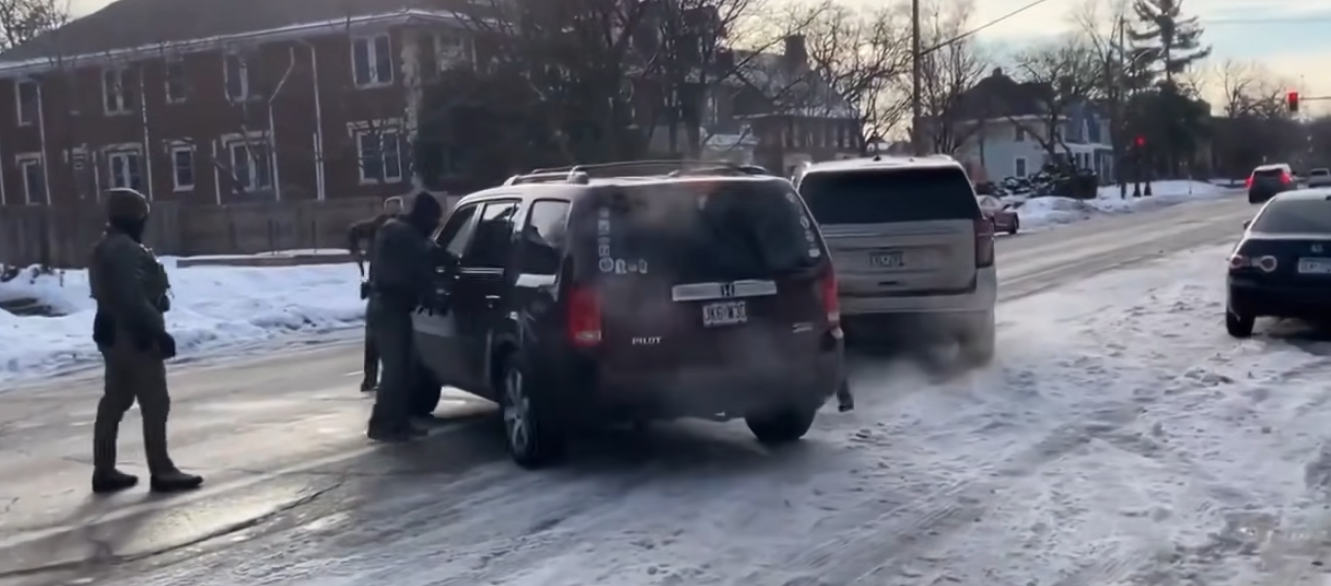Photos: YouTube
In the following column, Dr. Wim Laven speaks on the current tension between individual rights; the rights of the larger public, and the government’s regulatory involvement in the two–especially, as it relates to the current controversy regarding COVID vaccines and mandates, as well as the anti-abortion actions of Republicans.
In the first few weeks of class I usually ask students: can you think of any part of your daily life that is not regulated?
It takes a minute to explain, but I use going to the bathroom as an example. It is good for a laugh, but students remember the recent efforts to decide who gets to use which bathrooms, and obviously we want to be careful about our waste, and so on…
There is good reason people cannot walk out into the middle of a traffic, pull down their pants, and urinate between passing cars. It would create a hazard and threaten everyone’s safety.
My intention is to get students to understand rights, liberties, and the restrictions against them divorced from their political positions. At points, I will even argue that good governance—restrictions—actually make us more free. Like when we can speed down freeways in relative safety because we trust that everyone will drive in the right direction and nobody will be urinating in the middle of the lane.
I ask: do you know why you cannot falsely yell fire in a crowded theater? Most of my students have heard about restrictions on the freedom of speech, but they are generally less familiar with some of the history. People have been trampled to death when such stampedes have happened.
“Fire!” is restricted when shouting it presents a clear and present danger.
One’s individual freedoms can be restricted when they push against or compete with another’s rights and liberties. The government is expected to manage some behaviors in order to keep us safe.
We also have expectations for the regulation of commerce and the environment. A business is not allowed to lie about what they are selling or dumping into a river. Nobody is legally free to poison our water supply.
I do my best to articulate two fundamental political questions before we discuss the sides. In the first political question citizens have to confront the trade-off between freedom and law and order. The second question is of the tension between freedom and equality. When, I ask, “are you willing to diminish your freedoms?” I’m setting them up. It is easy to give up other people’s freedoms and rights that are not important, but sacrifice is not easy—it better be worth it. Students tend to accept that speed limits are good because they reduce traffic accidents and make them less lethal. Many gun enthusiasts say they can accept 72-hour waiting periods for gun purchases if they actually reduce suicide deaths.
I cannot tell you how many times students have paraphrased Benjamin Franklin, “Those who would give up essential Liberty, to purchase a little temporary Safety, deserve neither Liberty nor Safety.” He was responding to a tax dispute, though people apply this to gun rights, privacy, and everything else, but it answers the wrong question. Those are the freedoms you are not willing to give up, but you do give up freedoms all the time. You accept that you may not marry nor have legal sex with a 12-year-old. You accept that you may not engage in child sacrifice to appease your god. You accept that you may not move into a neighbor’s home while she is at work and claim it as your own. The list of limits on your freedoms that you already accept is long indeed.
The current political climate gives parallel examples. One in 500 Americans have been killed by COVID-19 and there are debates on mandates for masks and vaccines. Texas has created a bounty system, $10,000 to any private citizen who turns in anyone who helps a person get an abortion once fetus cardiac activity is detectable (often so early in a pregnancy that the mother is unaware she is pregnant). And in Texas there is no exception for rape or incest—even when the rape or incest victim is a minor.
Overflowing hospitals and ICUs are compounding the problem. Treatable conditions are becoming fatal when patients are unable to get receive care; one story “A Man Died After Being Turned Away From 43 ICUs At Capacity Due To COVID” describes a healthcare system beyond overwhelmed.
The Centers for Medicare and Medicaid Services (CMS) reports that COVID-19 hospitalizations average $24,033. A review of data from the CDC and CMS indicates that costs for preventable (unvaccinated adults) COVID-19 hospitalizations for the last three months, from June through August 2021, exceeds $5 billion.
It is all political; one side calls it the price of freedom, the other calls it preventable tragedy.
In my field of conflict transformation, I avoid coercive winner-takes-all approaches. I received my vaccine on the first day I was eligible. I reviewed the information and made the choice I thought was best for my community, family, and myself—informed consent.
I do not like the Texas law that removes choice and consent from pregnant women in their reproductive outcomes. I cannot imagine the government forcing anyone to deliver the child of their rapist or punishing individuals for helping women exercise autonomy in their medical choices. It is also clear that while COVID mandates have clear positive impacts on public health that abortion restrictions have negative health impacts.
I preach informed consent for a number of ethical and moral issues. There have been issues with the strategy of inconveniencing people as a way to force them to get the vaccines. There are legitimate reasons for people to have trust issues, after-all there is a long history of lies made by the government and its institutions. The National Vaccine Injury Compensation Program reports $4,273,742,418.51 in payments to petitioners through 2021 and the Vaccine Adverse Event Reporting System (VAERS) does make clear that while injuries are rare they do exist.
I also preach evidence-based decision-making and trust. This is what causes me the greatest concern. Ideological divides are causing people to dig into positions rather than make a careful review of the evidence. We are not healing, in part, because we are not committed to honest engagement. There is a clear tension: vaccines save lives but some people do not want vaccines.
Yes, a small number of those who get vaccines suffer injuries—bad side effects. The more than $4 billion in injury payments for vaccine injuries pales in comparison to the $16 Trillion COVID-19 price tag, but those who have suffered from vaccine injuries (even if rare) have legitimate complaints. We are seeking fair standards for all and the search does not have to be hate-filled.
The problem is not the people who have been confused or conned, the problem is that the campaigns to embolden conspiracy and empower skepticism have gained a great foothold.
Research is misrepresented all the time and issues become conflated. While one big lie was being told on January 6th—that the election was stolen from Donald Trump—another one was also being told—”I wish I could tell you that Tony Fauci cares about your safety… I wish I could believe that voting machines worked… but none of this is happening,” according to Del Bigtree, a leader in the Anti-Vax movement.
The CDC is reporting that in August hospitalizations for children and adolescents quadrupled in states with low vaccination rates compared with states with higher vaccination rates. The pandemic is evolving, this should mean a return and recommitment to using the best data and methods available, but there has been no such consensus. For better and worse they do get to tell us what to do with our bodies, better when policies promote best practices—the mask I wear could save your life—and worse when politicians play games with human life.
If the US does not reverse course on the anti-science trajectory, then the public will continue to suffer the consequences of unmanaged pandemics. But we will also be poorly prepared for other mounting crises. With the pandemic those who get the shots have a healthy chance at survival, but with other looming threats, like climate change, the anti-science campaign threatens species extinction. We need to get better before better is not possible.
Wim Laven, Ph.D., syndicated by PeaceVoice, teaches courses in political science and conflict resolution.








